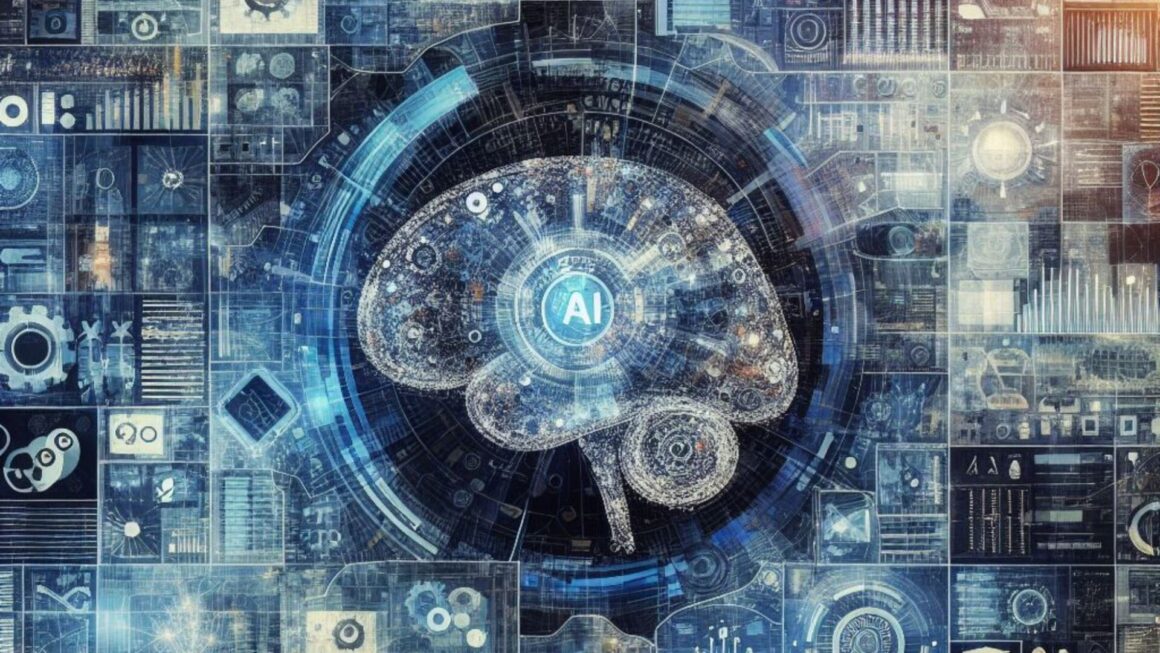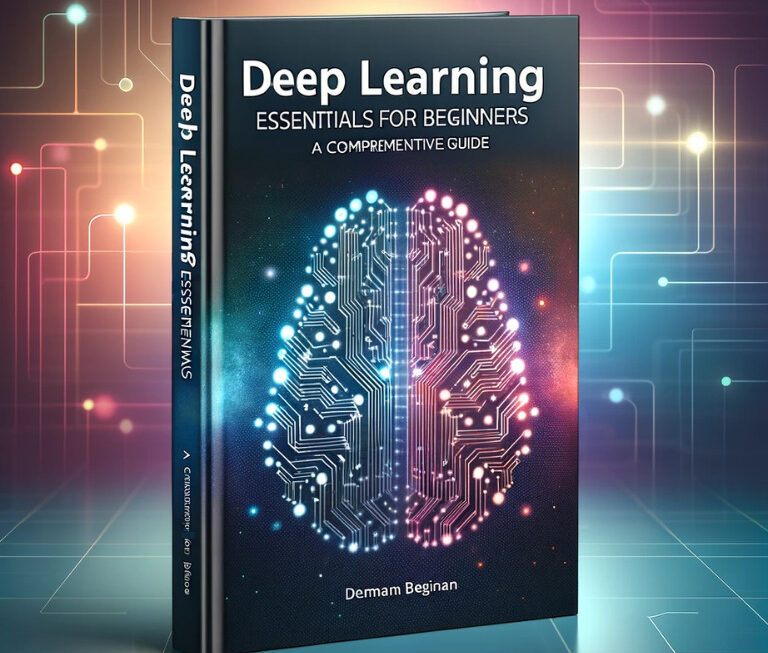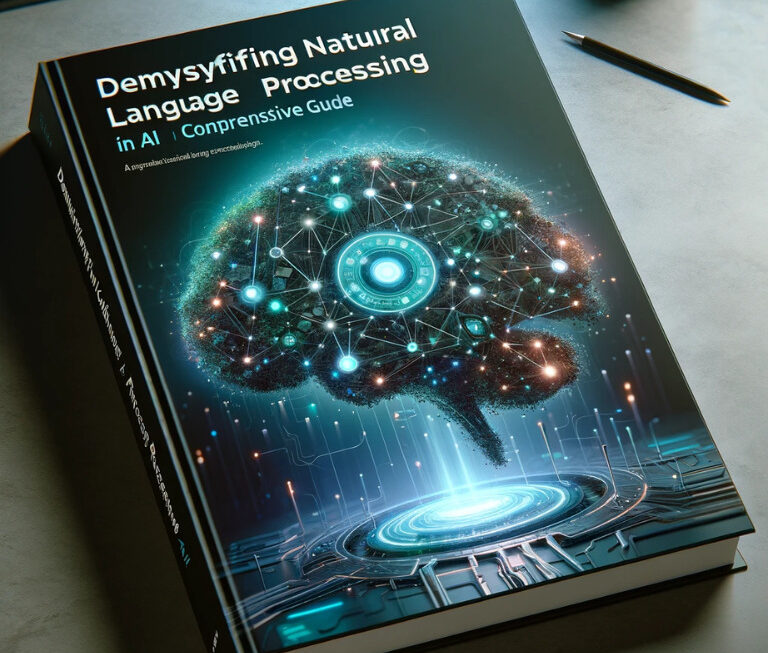The integration of Artificial Intelligence (AI) into the realm of software development marks a pivotal shift in how programmers approach coding tasks. AI’s foray into this field isn’t just a fleeting trend; it’s a transformative movement that’s reshaping the landscape of development. Among the most notable advancements is the emergence of AI-powered code completions, a tool that’s swiftly becoming indispensable for developers seeking to enhance their productivity and code quality.
The Rise of AI in Software Development
AI has been a buzzword across various industries, but its practical application in software development has been nothing short of revolutionary. From predictive algorithms that anticipate a user’s next move to sophisticated machine learning models that automate complex tasks, AI is the new craftsman in the digital workshop of coders.
In the context of coding, AI’s role has evolved from a silent observer, analyzing data and user behavior, to an active assistant that offers intelligent suggestions and automations. This evolution has been fueled by the vast amounts of code available in public repositories, which AI systems can learn from to understand programming patterns and practices.
Brief Overview of AI-Powered Code Completions
AI-powered code completions are systems that provide real-time suggestions to developers as they write code. These suggestions are not just simple predictions based on the current line of code but are context-aware recommendations that understand the scope, variables, and even the intended functionality of the code being written.
Imagine typing out a function, and before you’ve even finished declaring the parameters, your AI assistant has already suggested the most efficient way to execute the task at hand. It’s like having a pair of extra hands on the keyboard, ones that have been trained on the collective knowledge of the global developer community.
These AI systems are trained on vast datasets comprising high-quality, open-source code from repositories like GitHub. They use machine learning algorithms, particularly deep learning, to understand coding patterns and the semantics of various programming languages. This enables them to predict not just the next character or word, but entire blocks of code that can save developers countless keystrokes.
Moreover, AI-powered code completions are not static; they learn and adapt. As they are exposed to more code and receive feedback from their human counterparts, these systems become more accurate and efficient, leading to a symbiotic relationship between the coder and the AI.
Understanding AI-Powered Code Completions
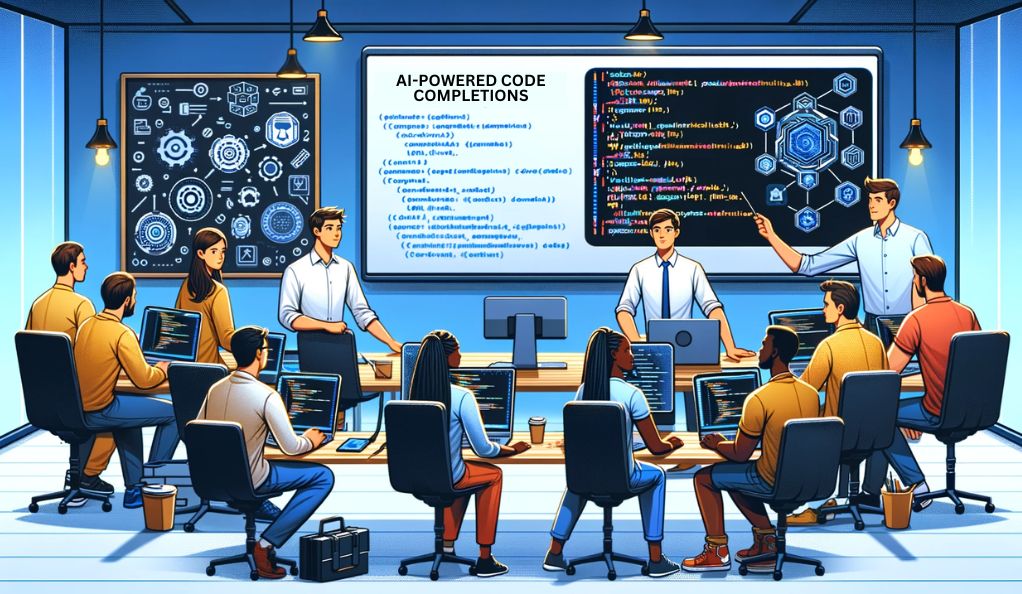
To truly appreciate the value of AI-powered code completions, it’s essential to grasp what they are and the intricacies of their operation. These tools are not mere text expanders or snippet generators; they are sophisticated software companions that assist in the creation of code by predicting and suggesting entire segments of functional code in real-time.
What are AI-powered code completions?
AI-powered code completions are advanced tools that leverage machine learning, especially deep learning techniques, to predict and suggest the next piece of code a developer might need. Unlike traditional autocompletion tools that rely on simple pattern matching, AI completions understand the syntax and semantics of the code, providing contextually relevant suggestions.
How do they work?
At the heart of AI-powered code completions is a model often referred to as a language model. This model has been trained on a diverse set of programming languages and codebases, learning from the structure, style, and syntax of countless lines of code. When a developer starts typing, the model predicts the next series of tokens (which could be characters, keywords, or even larger code blocks) that are likely to follow.
The process involves several steps:
- Tokenization: The code is broken down into manageable pieces, called tokens, which could be as small as individual characters or as large as complete statements.
- Pattern Recognition: The AI model uses these tokens to identify patterns and structures in the code that it has learned during its training.
- Contextual Analysis: It then analyzes the current context of the code, taking into account variables, functions, and even the coding style.
- Prediction Generation: Based on this analysis, the model generates predictions for what the code should do next.
- Ranking and Suggestion: These predictions are ranked by their likelihood, and the top suggestions are presented to the developer.
The technology behind AI code suggestions
The technology underpinning these AI systems is primarily based on a type of neural network called a Transformer, which has proven to be highly effective in understanding and generating human language. This same technology, when applied to code, allows the AI to not just understand the syntax but also the intent behind the code, enabling it to provide highly accurate suggestions.
To illustrate, consider the following pseudocode example:
function calculateArea(radius) { return }An AI-powered code completion tool might suggest completing the function with Math.PI * radius * radius, understanding that the function name and parameter imply the calculation of an area, likely of a circle given the single parameter radius.
This level of suggestion is made possible by the AI’s understanding of coding patterns and its ability to apply this understanding in real-time, offering developers a powerful tool to accelerate their coding process.
The Benefits of Using AI for Code Completions
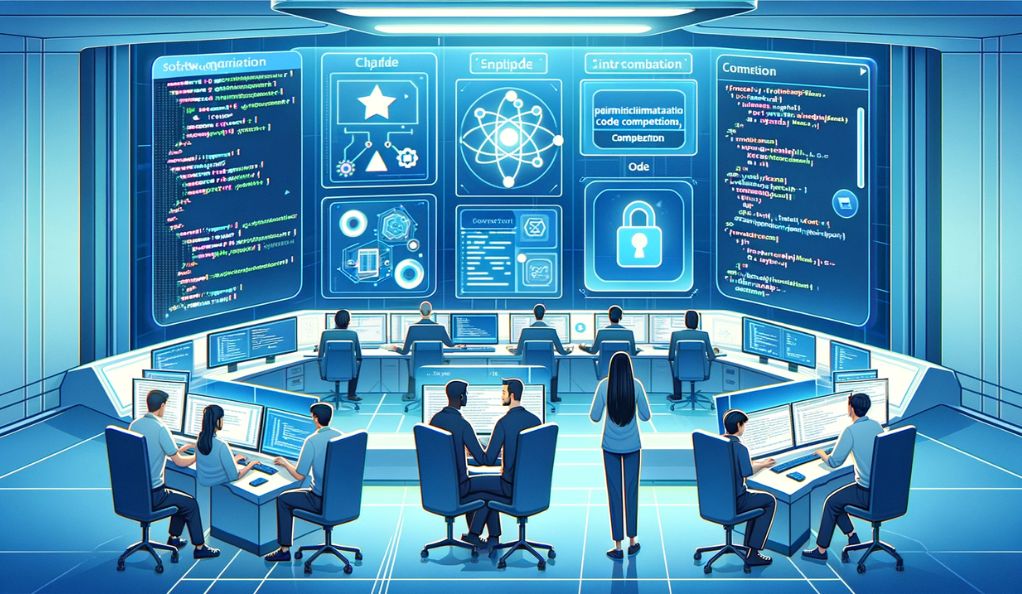
The advent of AI-powered code completions has brought a plethora of benefits to the coding world. These tools are not just about automating the mundane or accelerating the pace of coding; they are reshaping the very nature of software development by enhancing efficiency, accuracy, and even the learning curve for new programmers.
Speeding up the Coding Process
One of the most immediate benefits of AI-powered code completions is the significant reduction in typing required. By suggesting entire blocks of code, these tools can save developers from the tedium of writing boilerplate code and repetitive structures. This allows developers to focus on the more creative aspects of programming, such as designing algorithms and implementing complex logic.
For example, a developer working on a web application might need to write several event handlers that follow a similar pattern. An AI-powered tool can recognize this pattern and suggest complete handlers after just a few keystrokes, turning minutes of coding into seconds.
Reducing Errors and Improving Code Quality
AI code completions help maintain a high standard of code by reducing syntax errors and suggesting best practices. Since the suggestions are based on well-written code from a vast corpus, they often reflect high-quality coding standards that can serve as on-the-fly peer reviews.
Moreover, these tools can help in adhering to coding conventions and style guides. By consistently suggesting code that aligns with these guidelines, they promote uniformity in the codebase, which is crucial for maintainability and readability.
Learning from the Best Coding Practices
For novice developers, AI-powered code completions can be an invaluable learning tool. By exposing them to industry-standard code and practices, these tools provide real-time, context-aware examples of how certain tasks are typically handled by more experienced developers.
This aspect of AI code completions can be likened to a form of pair programming where the “senior developer” is the collective intelligence of the AI, distilled from the best coding practices available.
- Enhancing Collaboration and Consistency
In team environments, maintaining a consistent coding style and approach can be challenging. AI-powered code completions can suggest code that aligns with the team’s or project’s standards, thus fostering a more cohesive and collaborative environment. This consistency is not just about aesthetics; it can reduce the cognitive load on team members when reading and understanding each other’s code, leading to more efficient team dynamics. - Adapting to Personal Coding Styles
While AI code completions are trained on general coding practices, many tools offer personalized experiences by learning from the individual’s coding habits. Over time, the AI tool adapts to the developer’s unique style and preferences, further enhancing productivity and comfort. - Streamlining Code Documentation
Good documentation is crucial, but often neglected due to time constraints. AI-powered tools can assist in generating docstrings and comments based on the code’s structure and functionality, helping to keep the documentation up-to-date with minimal effort from the developer. - Facilitating Language Learning and Switching
Developers often need to work with multiple programming languages, and switching between them can be a source of errors and inefficiency. AI-powered code completions can ease this transition by providing language-specific suggestions, reducing the mental overhead required to switch contexts.
Integrating AI Completions into Your Development Workflow
Embracing AI-powered code completions is not just about installing a plugin and watching it work its magic. It requires a thoughtful integration into your development workflow to truly harness its potential. Here’s how you can make AI completions a seamless part of your coding routine.
Choosing the Right AI Coding Assistant
The market offers a variety of AI-powered coding assistants, each with its own set of features and supported languages. When selecting an AI assistant, consider the following:
- Language Support: Ensure the tool supports the programming languages you use.
- Integration: Look for tools that integrate smoothly with your preferred development environment or IDE.
- Customization: The ability to customize the behavior of the AI, such as the aggressiveness of suggestions, can be crucial for fitting into your workflow.
- Privacy and Security: Understand how the tool handles your code, especially if you work with sensitive data.
Setting up Your Environment for AI Completions
Once you’ve chosen an AI assistant, setting up your environment is the next step. This typically involves:
- Installing Plugins or Extensions: Most AI completions come as plugins for popular IDEs or as standalone applications that can be integrated into your coding environment.
- Configuration: Configure the tool according to your preferences, which might include setting keybindings for accepting suggestions or adjusting the suggestion frequency.
Best Practices for Integrating AI into Your Coding Routine
To get the most out of AI-powered code completions, consider adopting these best practices:
- Learn the Shortcuts: Familiarize yourself with the keyboard shortcuts to accept, reject, or navigate through suggestions quickly.
- Start with Non-Critical Projects: Initially use the AI assistant on smaller, non-critical projects to understand its capabilities and limitations.
- Provide Feedback: Many tools allow you to provide feedback on suggestions. Doing so can improve the tool’s accuracy over time.
- Balance Use with Learning: While AI tools can increase productivity, ensure you understand the code being suggested to avoid becoming overly reliant on the tool.
- Review Suggestions: Always review the AI’s suggestions to ensure they align with your project’s requirements and coding standards.
Overcoming the Initial Learning Curve
There might be a learning curve when you first start using an AI coding assistant. The AI needs to adapt to your coding style, and you need to become accustomed to working with its suggestions. Patience and consistent use will help you overcome this initial phase, leading to a more productive coding experience.
The Future of Coding with AI Completions

As we stand on the cusp of a new era in software development, it’s clear that AI-powered code completions are not just a passing trend but a harbinger of a more efficient and intelligent coding paradigm. Let’s explore what the future may hold for coding with the aid of AI.
Predictions for AI in Software Development
The trajectory of AI in software development points towards even more sophisticated and intuitive tools. Here are some predictions:
- Enhanced Personalization: AI tools will become more adept at adapting to individual coding styles, offering even more personalized suggestions.
- Cross-Language Learning: Future AI systems may offer insights across different programming languages, allowing for seamless transitions and multi-language code generation.
- Proactive Error Correction: Beyond suggestions, AI could provide real-time error correction and even preemptively identify potential bugs based on common coding pitfalls.
- Integrated Development Environments (IDEs): We may see the rise of IDEs built around AI-powered coding assistants, designed from the ground up to maximize the benefits of AI completions.
Upcoming Features in AI-Powered Coding Tools
Developers can look forward to a range of new features in AI-powered coding tools:
- Voice-to-Code: The integration of voice recognition to directly translate spoken instructions into code.
- Automated Refactoring: AI that can suggest and execute code refactoring to improve performance and maintainability.
- Code Review Assistance: AI that can participate in code reviews, providing insights and suggestions for improvements.
Preparing for an AI-Augmented Coding Future
To stay ahead in this AI-augmented future, developers can take several steps:
- Continuous Learning: Keep abreast of the latest developments in AI and machine learning, and understand how they apply to coding.
- Adaptability: Be open to changing workflows and trying out new tools that incorporate AI into the coding process.
- Ethical Considerations: Engage with the ethical implications of AI in coding, including the potential for bias in AI-generated code and the importance of maintaining human oversight.
Embracing Change and Innovation
The integration of AI into coding is a clear sign that the field of software development is evolving. Developers who embrace this change and learn to work alongside AI will find themselves at the forefront of innovation, ready to tackle the challenges of tomorrow with the best tools at their disposal.
Conclusion: Embracing AI for Enhanced Productivity
The exploration of AI-powered code completions reveals a transformative tool that is reshaping the software development landscape. These intelligent systems not only expedite the coding process but also elevate code quality by drawing from a wellspring of best practices. They serve as both mentors for the learning coder and as accelerators for the experienced developer. As the technology advances, integrating AI into our coding practices requires a balanced approach—leveraging the power of automation while maintaining the irreplaceable value of human insight and creativity.
As we stand at the threshold of this new era in coding, it is the continuous pursuit of knowledge and the willingness to adapt that will empower developers to fully harness the potential of AI. The journey towards AI-enhanced coding is not just about improving efficiency; it’s about envisioning a future where the symbiosis of human and machine intelligence spawns a new caliber of software development. Embracing AI-powered code completions today is a step into a future where our coding capabilities are boundless, and our creative horizons are ever-expanding.


